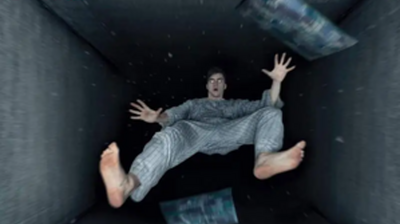Entertainment
Sofia Opera’s revival of Das Rheingold has extra vibrant visible splendours backed by magnificent singing – Seen and Heard Worldwide
 Bulgaria Wagner, Das Rheingold: Soloists, ‘Talasumche’ Kids’s Vocal and Drama Basis, Orchestra of Sofia Opera and Ballet / Evan-Alexis Christ (conductor). Sofia Opera, 15.6.2024. (GT)
Bulgaria Wagner, Das Rheingold: Soloists, ‘Talasumche’ Kids’s Vocal and Drama Basis, Orchestra of Sofia Opera and Ballet / Evan-Alexis Christ (conductor). Sofia Opera, 15.6.2024. (GT)
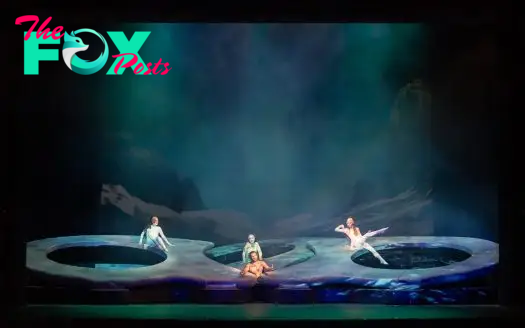
As a pupil, Plamen Kartaloff visited Bayreuth in 1970 and have become a devotee of Richard Wagner’s operas and decided to take the music of Wagner to Bulgaria. Regardless of an virtually countless conveyor belt to the world’s opera levels of excellent singers of Italian, French, and Russian operas, Wagner was a rarity in Bulgaria. Following his appointment as supervisor of the Sofia Opera and Ballet, Kartaloff resolved to supply the Ring cycle in his residence nation with completely Bulgarian singers. The issue was overcoming ‘virtually centuries-old prejudices of administrators, conductors, singers, and conventional opera audiences that Richard Wagner’s work just isn’t for us. And each creative director should have the imaginative and prescient to develop the repertory coverage of the nationwide opera theatre in direction of new horizons with never-before-seen works from completely different composer colleges and types.’
Traditionally, the primary Wagner opera to be staged in Sofia was The Flying Dutchman in 1930, and solely Das Rheingold appeared from the Ring cycle in 1943, and solely in 2010, was Kartaloff’s Ring undertaking launched by Sofia Opera. Final yr’s new manufacturing positioned Kartaloff’s undertaking on a excessive creative degree with collaboration in making the units with Hans Kudlich from Vienna and fascinating the German conductor Constantin Trinks for all of the Wagner Pageant operas besides The Flying Dutchman. A vital a part of the whole undertaking was the German musicologist Richard Trimborn who had assisted in coaching the singers. Since launching Kartaloff’s imaginative and prescient of utilizing Bulgarian singers, Wagner operas have by no means left the repertoire.
So profitable had been the stagings of the primary Sofia Ring cycle that the corporate toured to Minsk in 2012, to Ljubljana in 2015, Füssen in Bavaria in 2015, to Moscow’s Bolshoi Theatre in 2018, once more to Füssen in 2023 and earlier this yr to Skopje in Northern Macedonia. All of those performances have boosted Sofia Opera’s status along with the acclaimed launch on DVD and Blu-ray of their 2013 Ring cycle. For this revived Ring cycle in 2024, guests from over 20 international locations got here to listen to Sofia Opera’s Wagner Pageant.
Because the Prelude started on the important thing of E-flat main, spectacular visible projections introduced the impression of the depths of the Rhine, and because the curtains opened, three nice circles (triskels) appeared with the Rhinemaidens leaping up and down as if flying within the air. This opening scene developed with the amorous Rhinemaidens enjoying with the lust-driven Alberich, who was charmed by one after one other till Flosshilde mounted on the reclining Alberich, attractive him ‘Seligster Mann!’. The Rhinemaidens had been lither of their frolicking and extra sensual, coming shut with the lusty Alberich looking for sexual pleasures earlier than discovering the existence of riches from the gold. The looks of the golden horde was lit by shimmering colors towards the gorgeous orchestral harmonies.
Within the first scene, we see Fricka and Wotan resignedly mendacity towards the edges of one of many triskels. The portrayal of Fricka and Wotan was excellent, and the singing drew one to the drama, enhanced by the gray and scarlet colors of the gods within the build-up. The Wotan of Veselin Mihaylov was magnificent, and the exchanges with Fricka had been usually life like of a quarrelling couple lengthy since fed up with one another. Daniel Ostretsov’s Loge was particularly noticeable along with his motion, facial and physique actions, and voice – much more convincing than final yr. The 2 giants seem within the opening scene and amble off as they observe their work on Valhalla.
The thrilling descent to Nibelheim was dramatic, whereas the three cube-like buildings with the slaves hammering on their anvils had been spectacular towards the black and pink background. It was extra extraordinary than final yr. Once more, one was impressed by the fixed intrigues concocted by Loge – one may see parallels in his deceitful and crafty wickedness with present-day politicians, so life like was his characterisation, particularly when singing ‘Kennst du mich intestine, kindischer Alp?’ and trying to deceived Alberich. As soon as once more, each nuance of his tenor voice hinted at new indignities to observe for Alberich and his entrapment as he grew to become a frog was marvellously and realistically enacted.
The ascent from Nibelheim to the mountaintops was represented realistically by the nice raised triskels, and dramatically enacted with Wotan and Loge escorting the tied-up Alberich, vividly demonstrated by Loge’s ‘Da, Vetter sitze du fest!’ All of a sudden, the looks of Erda introduced the warning of the long run catastrophe, ‘Weiche, Wotan! Weiche!’ admonishing him to surrender his need for the ring, but Wotan relents upon his lust for riches and energy and surrenders the ring to the giants. Now, with the ring, Fafner brutally murders Fasolt.
As soon as extra, Loge sees the ominous dilemma dealing with the Gods and jests at Wotan’s lack of fine fortune ‘Was gleicht, Wotan wohl deinem Glücke?’. The lightning strike was spectacular visually and sonically, and because the triskels disappear, Wotan escorts Fricka to Valhalla, as within the foreground, Loge prophetically sings ‘Ihrem Ende eilen sie zu’, foreseeing their extinction, whereas the Gods make their solemn option to their accomplished fortress, and we see the Rhinemaidens lamenting ‘Rhinegold! Rhinegold! And because the gods method Valhalla, the curtains drops on this magnificent climax.
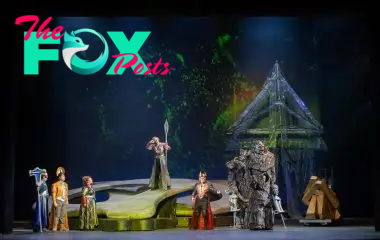
Probably the most spectacular singing and characterisation was from the younger Bulgarian Veselin Mihaylov in his debut as Wotan. Final yr, it was the veteran Nikolay Petrov who was Wotan, and on the proof of this night, he has a worthy successor within the younger Mihaylov. His portrayal was magnificent, with a wonderfully wealthy baritone backed by large projection and stage presence. One seems to be ahead to his future performances. Marian Zvetkova’s Fricka was large each vocally and in characterisation of the spouse of the untrue God Wotan, in each facial features and delicate phrase, she was magnificent. Once more, Plamen Dimitrov was a superb Alberich, with magnificent appearing and singing dominating each scene he was concerned in. The Mime of Krassimir Dinev was a spotlight along with his grovelling tenor, at one time exhibiting humility after which wickedness in his self-serving character.
The Erda of Vesela Yaneva was glorious in voice and emotion and with a stage presence that made one pay attention to each expression. The orchestra below Evan-Alexis Christ sounded completely different from earlier than below Trinks. The American conductor shortened the ever so succinct phrasing, permitting extra vitality and pleasure and a faster tempo and growing the extreme energetic drama – but on the debit facet – typically drowned out a number of the singers within the quieter passages.
The singing of the dark-voiced bass Petar Buchkov as Fafner was excellent, as was that of the Fasolt by Stefan Vladimirov, although their giant-size costumes greater than hinted at cartoon imagery and appeared not the identical commonplace as these of the opposite characters. Hristiyana Mihaleva-Zorbalieva created fantastic designs for all of them, but the super-sized apparel of the giants was quite ridiculous by comparability.
This was an excellent higher staging than final yr; some features have been resolved and made clearer within the transition from one scene to a different, helping the movement of the drama on the stage and permitting the narrative to develop. Probably the most obvious and profitable innovation from final yr was the lighting design by Andrej Hajdinjak and the multimedia displays by Ivan Lipchev and Elena Shopova which created splendidly vibrant imagery within the Prelude depicting the Rhine and the scene in Nibelheim and the closing scene with the Rainbow Bridge to Valhalla, and the Rhinemaidens dancing on the finish. This revival was terrific and ready us nicely for extra exceptional singing in performances right here in Sofia.
Gregor Tassie
Forged:
Wotan – Veselin Mihaylov
Fricka – Mariana Tzvetkova
Alberich – Plamen Dimitrov
Loge – Daniel Ostretsov
Mime – Krassimir Dinev
Fafner – Petar Buchkov
Fasolt – Stefan Vladimirov
Donner – Svetozar Rangelov
Froh – Hrisimir Damyanov
Freia – Silvana Pravcheva
Erda – Vesela Yaneva
Woglinde – Stanislava Momekova
Wellgunde – Ina Petrova
Flosshilde – Alexandrina Stoyanova-Andreeva
Manufacturing:
Course – Plamen Kartaloff
Assistant Director – Yulia Krasteva
Set designer – Hans Kudlich
Costumes – Hristiyana Mihalev-Zorbalieva
Lighting design – Andrej Hajdinjak
Multimedia – Ivan Lipchev, Elena Shopova
Constructive improvement – Georgi Georgiev
Design and Construction – Boryan Belchev
Head of Manufacturing – Nela Stoyanova
Artist – Christiyan Stoyanov
-
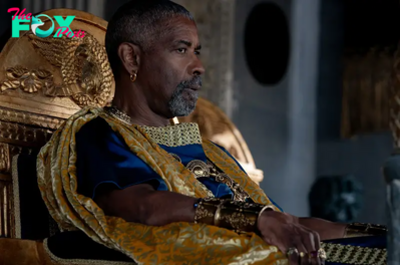
 Entertainment2h ago
Entertainment2h agoWhat to Know About Denzel Washington’s Gladiator II Character
-

 Entertainment3h ago
Entertainment3h agoChanges Made in New York to “Men Working” Construction Signs
-

 Entertainment12h ago
Entertainment12h agoRemembering Song Jae-rim: A Look at His Best Movies and K-Drama Performances
-
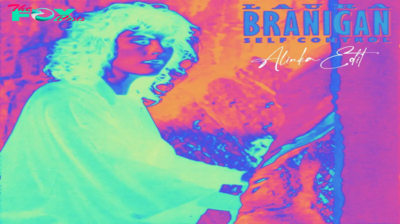
 Entertainment22h ago
Entertainment22h agoAmerica On CoffeeWe’re simply inviting you to take a timeout into the rhythmic ambiance of our breakfast, brunch and/or espresso alternatives. We’re pleased everytime you cease by.SELF CONTROL
-

 Entertainment1d ago
Entertainment1d agoOrange County Choppers Is Ready For Its Big Comeback
-
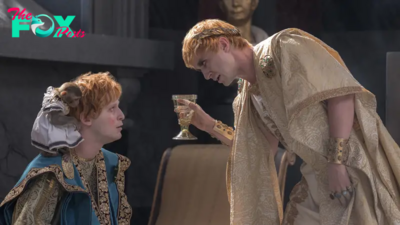
 Entertainment1d ago
Entertainment1d agoThe Real Story of Geta and Caracalla, the Roman Brother Emperors in Gladiator II
-

 Entertainment1d ago
Entertainment1d agoWhat Gladiator II Gets Right and Wrong About Real Fights in the Colosseum
-

 Entertainment1d ago
Entertainment1d agoSki Area Officially Opens the Ski Season For New York
